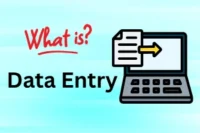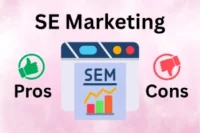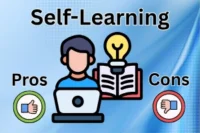Types of Websites: Guide to Website Categories
Published: 20 Aug 2025
When we go online and type a query into a search engine like Google, we are presented with various links to different websites.
Now, if our query is, for example, about the advantages and disadvantages of having a website, it’s obvious that informational sites will appear. However, if you were to type a news-related query, the results and the type of websites would also change.

So, guys, what I’m saying is that just like how changing the query alters the type of results, it also changes the type of websites that appear.
This is why I created an article for you that explores the different types of websites in detail, including their pros and cons.
So, let’s start with the definition of a website and then move on from there.
Types of Websites
Here, I have categorized all the types of websites into four main parts (Informational, Transactional/eCommerce, Interactive, and Other Types), which are further divided into sub-categories.
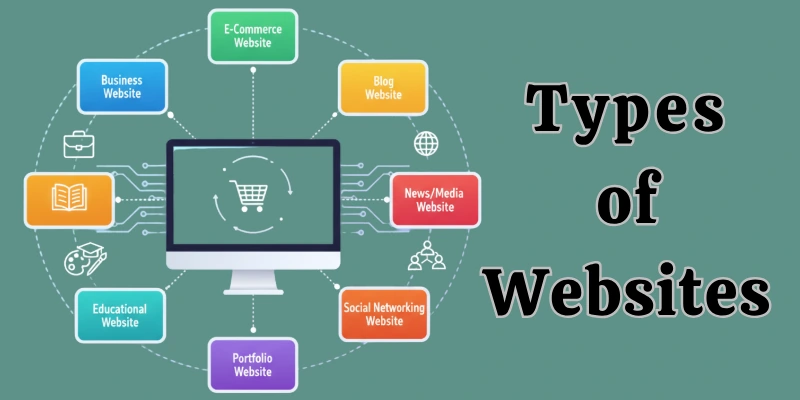
So, the main types with their sub-parts are mentioned below:
Informational Websites
- Educational (universities, tutorials, courses)
- News (national, local, niche)
- Entertainment (gaming, music, streaming)
- Nonprofit (charities, NGOs, foundations)
- Personal (portfolios, blogs, resumes)
- Government
- Business
- Travel
- Health
- Science & Technology
- History & Culture
- Arts & Entertainment
- Sports
- Hobbies & Interests
- Lifestyle
- Food & Recipes
- Fashion & Beauty
- Home & Garden
- Pets
- Finance & Investing
- Real Estate
- Jobs & Careers
- Automotive
- Legal
Transactional/eCommerce Websites
- Retail (Amazon, eBay, specialty stores)
- Service-based (travel booking, event ticketing, freelance platforms)
- Digital Products (software, music, courses)
- Crowdfunding
Interactive Websites
- Social Media (Facebook, Twitter, Instagram)
- Forums & Discussion Boards
- Online Communities & Membership Websites
- Gaming Websites & Online Games
- Educational Websites with Interactive Elements (quizzes, simulations)
Other Types of Websites
- Portfolio Websites
- Event Websites
- Directory Websites
- Landing Pages
- Microsites
- Wikis
- Blogs
- Podcasts
- Online Newspapers & Magazines
- Online Learning Platforms
- Job Boards
- Dating Websites
- Streaming Services
- Music & Video Streaming
- Live Streaming
- Video Conferencing
- Web Applications
- Web Services
Let us cover 50+ various kinds of websites in detail. I’m starting with informational websites.
Informational Websites
Informational websites are online places where people can share knowledge and facts about many different subjects.
The main thing they do is give users access to informational tools like news updates, educational materials, entertainment content, and more. These websites store a lot of information for users with a wide range of hobbies and needs.
Here is the list of all informational types of websites.
1. Educational (universities, tutorials, courses)
- Websites offering academic resources, online courses, and tutorials across different disciplines.
- Example: Khan Academy – Provides free educational content covering various subjects like math, science, and humanities.
2. News (national, local, niche)
- Platforms providing up-to-date coverage and analysis of current events, spanning local, national, and international news.
- Example: BBC News – Offers comprehensive news coverage from around the world, including articles, videos, and live updates.
3. Entertainment (gaming, music, streaming)
- Digital platforms featuring multimedia content such as videos, games, and music for recreational purposes.
- Example: YouTube – A video-sharing platform where users can watch a wide variety of content, including music videos, tutorials, and vlogs.
4. Nonprofit (charities, NGOs, foundations)
- Websites representing charitable organizations, NGOs, and foundations, showcasing their missions, projects, and impact.
- Example: Amnesty International – Provides information about human rights issues and campaigns worldwide, along with opportunities for involvement and donations.
5. Personal (portfolios, blogs, resumes)
- Online platforms serving as digital portfolios or blogs, where individuals share personal experiences, insights, and expertise.
- Example: Medium – A blogging platform where users can publish articles on various topics, including personal stories, opinions, and reflections.
6. Government
- Official websites of government agencies and institutions, offering information on public services, policies, and regulations.
- Example: USA.gov – Provides access to government information and services for citizens, including information on taxes, benefits, and voting.
7. Business
- Platforms dedicated to providing information about companies, industries, and economic trends, including reports, analyses, and market data.
- Example: Bloomberg – Offers financial news, market analysis, and data on stocks, currencies, and commodities.
8. Travel
- Websites offering travel guides, destination reviews, and booking services for travelers.
- Example: TripAdvisor – Provides reviews, recommendations, and booking options for hotels, restaurants, and attractions worldwide.
9. Health
- Online resources providing information on health and wellness, medical conditions, treatments, and preventive care.
- Example: WebMD – Offers medical information, symptom checkers, and articles on various health topics for consumers and healthcare professionals.
10. Science & Technology
- Platforms covering scientific research, technological advancements, and innovations in various fields.
- Example: National Geographic – Features articles, videos, and interactive content on science, nature, and exploration.
11. History & Culture
- Websites offering historical information, cultural insights, and heritage preservation efforts.
- Example: Smithsonian Institution – Provides access to resources, exhibitions, and collections related to art, history, science, and culture.
12. Arts & Entertainment
- Digital platforms focusing on artistic expressions, cultural events, and creative industries such as literature, visual arts, and performing arts.
- Example: The Metropolitan Museum of Art – Offers virtual tours, online exhibitions, and educational resources related to art and art history.
13. Sports
- Websites dedicated to sports news, event coverage, athlete profiles, and fan communities.
- Example: ESPN – Provides comprehensive coverage of sports news, scores, highlights, and analysis.
14. Hobbies & Interests
- Platforms offering resources and communities for enthusiasts of various hobbies and leisure activities.
- Example: Reddit – Features forums (subreddits) on a wide range of topics, including hobbies like photography, cooking, and gaming.
15. Lifestyle
- Online resources covering topics related to personal development, self-improvement, and lifestyle choices.
- Example: Lifehacker – Offers tips, tricks, and hacks for improving productivity, technology usage, and everyday life.
16. Food & Recipes
- Digital platforms featuring culinary content, recipes, cooking tips, and food-related articles.
- Example: Allrecipes – Provides a vast collection of user-submitted recipes, cooking videos, and tips for home cooks.
17. Fashion & Beauty
- Websites focusing on fashion trends, style guides, beauty tips, and cosmetics reviews.
- Example: Vogue – Offers fashion news, runway coverage, beauty trends, and celebrity style updates.
18. Home & Garden
- Online resources offering home improvement ideas, gardening tips, and interior design inspiration.
- Example: Houzz – Features articles, photos, and advice on home renovation, interior decorating, and landscaping.
19. Pets
- Platforms providing information on pet care, training, health, and adoption services for animal lovers.
- Example: The American Society for the Prevention of Cruelty to Animals (ASPCA) – Offers resources on pet adoption, animal welfare, and pet care tips.
20. Finance & Investing
- Websites offering financial news, investment advice, and resources for personal finance management.
- Example: Investopedia – Provides educational content, articles, and tutorials on investing, finance, and economics.
21. Real Estate
- Platforms featuring property listings, real estate market trends, and resources for buyers, sellers, and investors.
- Example: Zillow – Offers listings, home value estimates, and real estate market data for buyers, sellers, and renters.
22. Jobs & Careers
- Online resources offering job search tools, career advice, and professional development resources.
- Example: LinkedIn – A professional networking platform that offers job listings, career resources, and networking opportunities.
23. Automotive
- Websites covering automotive industry news, car reviews, maintenance tips, and vehicle-related information.
- Example: Car and Driver – Provides reviews, news, and buying guides for cars, trucks, and SUVs.
24. Legal
- Online resources providing legal information, advice, and resources on various legal topics and issues.
- Example: LegalZoom – Offers legal documents, forms, and services for personal and business needs.
Transactional/eCommerce
Transactional or eCommerce websites are digital platforms where users can buy and sell goods or services online. They serve as virtual marketplaces, facilitating transactions between buyers and sellers across various industries.
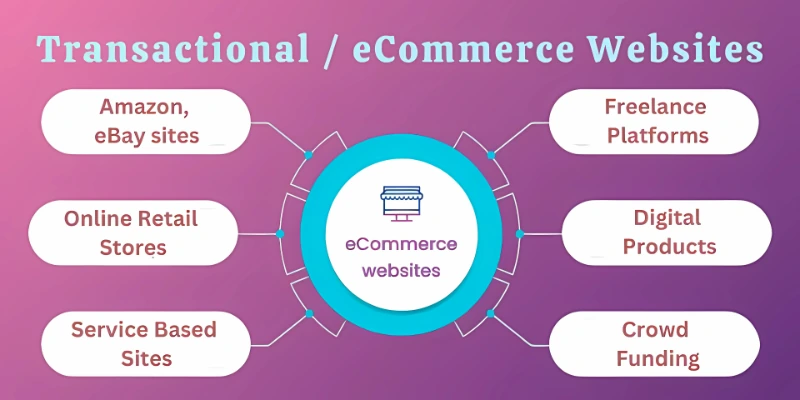
The primary purpose of these websites is to provide a convenient and secure platform for conducting business transactions over the internet. Whether it’s purchasing retail products, booking services, or acquiring digital goods, transactional websites offer a smooth shopping experience to users worldwide.
1. Retail (Amazon, eBay, specialty stores)
- Online marketplaces offering a wide range of products for sale, including electronics, clothing, books, and more.
- Example: Amazon – A leading eCommerce platform that sells a diverse array of products from various sellers, including its own inventory.
2. Service-based (travel booking, event ticketing, freelance platforms)
- Platforms allowing users to book services such as travel accommodations or event tickets or hire freelancers for projects.
- Example: Booking.com – A website where users can book accommodations, flights, car rentals, and other travel-related services.
3. Digital Products (software, music, courses)
- Marketplaces specializing in the sale of digital goods such as software, music, courses, ebooks, and digital downloads.
- Example: iTunes – An online store where users can purchase and download digital music, movies, TV shows, and other multimedia content.
4. Crowdfunding
- Platforms where individuals or businesses can raise funds for projects, products, or causes through contributions from the public.
- Example: Kickstarter – A crowdfunding platform where creators can launch campaigns to fund creative projects, inventions, and new products.
Interactive Websites
Interactive websites are digital platforms that allow users to actively engage with content, communicate with others, and participate in various activities.
In contrast to static websites, which only allow one-way communication, interactive websites urge users to interact and take part. Their goal is to make experiences that are comprehensive and interesting for users, encouraging connection, teamwork, and learning in an online setting.
These websites incorporate features such as social networking, discussion forums, gaming elements, and interactive educational tools to enhance user engagement and interaction.
1. Social Media (Facebook, Twitter, Instagram)
- Platforms that enable users to create profiles, connect with others, share content, and interact through comments, likes, and messages.
- Example: Facebook – A social networking site where users can connect with friends, share updates, and engage with content through likes, comments, and shares.
2. Forums & Discussion Boards
- Online platforms where users can post questions, share opinions, and engage in discussions on various topics.
- Example: Stack Overflow – A question and answer website for professional and enthusiast programmers to ask and answer questions, share knowledge, and solve problems.
3. Online Communities & Membership Websites
- Platforms that bring together users with shared interests, hobbies, or goals, allowing them to connect and collaborate.
- Example: Meetup – A platform that facilitates offline group meetings and events based on shared interests and activities.
4. Gaming Websites & Online Games
- Platforms offering a variety of interactive games and gaming communities for players to engage with.
- Example: Steam – A digital distribution platform for purchasing and playing video games, as well as connecting with other gamers through social features.
5. Educational Websites with Interactive Elements (quizzes, simulations)
- Platforms offering educational content enhanced with interactive elements such as quizzes, simulations, and interactive lessons.
- Example: Duolingo – A language-learning platform that uses interactive exercises, quizzes, and gamification to engage users in learning new languages.
Other Websites Types
Other website types include a wide range of digital platforms that are made for specific reasons and are not informational or interactive websites. These types of websites are used for different things and meet different needs by giving people specific features and functions.
These websites are very important for many types of online contact, collaboration, and engagement, from showing off portfolios and planning events to making it easier to learn online and look for work.
1. Portfolio Websites
- Portfolio websites are online platforms where individuals, freelancers, or businesses showcase their work, projects, skills, and achievements to potential clients or employers.
- Example: Behance – A platform where designers, artists, and creatives showcase their portfolios and connect with potential clients or collaborators.
2. Event Websites
- Event websites are online platforms designed to provide information, registration, and organization for events such as conferences, seminars, festivals, or workshops.
- Example: Eventbrite – A platform for organizing and promoting events, selling tickets, and managing registrations.
3. Directory Websites
- Directory websites are online databases or listings of businesses, services, organizations, or resources categorized by industry, location, or other criteria.
- Example: Yelp – A directory website where users can find and review businesses such as restaurants, shops, and services in their area.
4. Landing Pages
- Landing pages are single-page websites designed with a specific goal in mind, such as capturing leads, promoting a product or service, or encouraging a particular action.
- Example: Mailchimp Landing Page Builder – A tool for creating landing pages to promote products, events, or offers and capture visitor information.
5. Microsites
- Microsites are small, standalone websites created for a specific campaign, product, event, or promotion, often separate from the main website.
- Example: Coca-Cola Happiness Flag – A microsite created by Coca-Cola for the FIFA World Cup, allowing users to create and share virtual flags representing their countries.
6. Wikis
- Wikis are collaborative websites that allow users to contribute, edit, and organize content collectively. They are often used for creating and maintaining knowledge bases, documentation, or encyclopaedias.
- Example: Wikipedia – An online encyclopedia where users can collaboratively create, edit, and review articles on a wide range of topics.
7. Blogs
- Blogs are online platforms where individuals, organizations, or businesses publish articles, opinions, insights, or personal stories on various topics in a chronological format.
- Example: The Huffington Post – A news and opinion website featuring articles, blogs, and commentary on politics, entertainment, and lifestyle.
8. Podcasts
- Podcasts are digital audio programs available for streaming or download, covering a wide range of topics such as interviews, storytelling, news, education, or entertainment.
- Example: The Joe Rogan Experience – A popular podcast hosted by Joe Rogan featuring long-form conversations with guests from various fields, including comedy, science, and sports.
9. Online Newspapers & Magazines
- Online newspapers and magazines are digital platforms offering news articles, features, and multimedia content covering current events, entertainment, lifestyle, and other topics.
- Example: The New York Times – A digital newspaper providing news coverage, analysis, opinion pieces, and multimedia content on global events and issues.
10. Online Learning Platforms
- Online learning platforms are websites offering courses, tutorials, or educational resources for self-paced learning on various subjects, skills, or disciplines.
- Example: Coursera – An online learning platform offering courses from universities and institutions worldwide on topics ranging from business and technology to arts and humanities.
11. Job Boards
- Job boards are online platforms where employers post job listings and job seekers search for employment opportunities, often including features for resume submission, application tracking, and job alerts.
- Example: Indeed – A job search engine aggregating job listings from various sources, including company websites, job boards, and staffing agencies.
12. Dating Websites
- Dating websites are online platforms where individuals create profiles and interact with others for the purpose of meeting potential romantic partners.
- Example: Match.com – A dating website where users can create profiles, search for matches, and communicate with other users to find romantic connections.
13. Streaming Services
- Streaming services are online platforms that deliver audio, video, or live content over the internet to users’ devices, allowing them to watch or listen to content on-demand or in real-time.
- Example: Netflix – A subscription-based streaming service offering a wide range of movies, TV shows, documentaries, and original content for streaming on various devices.
14. Music & Video Streaming
- Music and video streaming websites are platforms dedicated to delivering audio or video content over the internet, allowing users to listen to music or watch videos on-demand.
- Example: Spotify – A music streaming service that provides access to a vast library of songs, albums, playlists, and podcasts for streaming on computers, smartphones, and other devices.
15. Live Streaming
- Live streaming websites enable users to broadcast or watch live video content in real-time over the internet, covering events, performances, gaming, and more.
- Example: Twitch – A live streaming platform primarily focused on video gaming, where users can watch live gameplay, interact with streamers, and participate in chat discussions.
16. Video Conferencing
- Video conferencing websites provide tools and services for conducting online meetings, presentations, or virtual gatherings through video and audio communication.
- Example: Zoom – A video conferencing platform that allows users to host and join virtual meetings, webinars, and conferences with features for screen sharing, chat, and recording.
17. Web Applications
- Web applications are interactive software programs accessed and operated through a web browser, providing users with functionalities similar to traditional desktop applications.
- Example: Google Docs – A suite of web-based office applications, including word processing, spreadsheets, and presentations, allowing users to collaborate in real-time.
18. Web Services
- Web services are online services or APIs (Application Programming Interfaces) that provide specific functionalities or data accessible over the internet, often used for integration with other software systems.
- Example: Google Maps API – A web service providing access to mapping and location data, allowing developers to integrate maps, geolocation, and routing functionalities into their applications.
Most Popular Types of Websites Today
So guys, here are the top website types people use nowadays:
- Ecommerce websites – for online shopping.
- Business websites – to show company details.
- Blog websites – for sharing ideas and guides.
- Portfolio websites – to display work samples.
- Educational websites – for courses and learning.
- News websites – for latest updates and reports.
- Entertainment websites – for movies, music, and games.
- Social media websites – to connect and share.
- Personal websites – for hobbies or self-introduction.
- Nonprofit websites – for charities and causes.
Conclusion
In summary, this article has introduced a wide array of website types, totalling over 50 different categories. This article covers a wide range of topics in the online world, from informational and e-commerce platforms to engaging sites and a number of specialized web services.
Through these different types of websites, the internet gives you a huge selection of things to do, like learn, meet with other people, shop, and go on adventures.
FAQs
Here are some of the most frequently asked questions related to website types:
The three main types of websites are:
- Informational websites: Provide information and resources on various topics.
- eCommerce websites: Facilitate buying and selling of products or services online.
- Interactive websites: Engage users through interactive features such as social media, forums, or multimedia content.
There are numerous types of websites, spanning various categories such as informational, eCommerce, interactive, personal, educational, and more. The exact number may vary depending on classification criteria, but there are well over 50 different types of websites.
The three types of personal websites include:
- Portfolio websites: Showcasing individual or professional work and achievements.
- Blogging websites: Platforms for individuals to share thoughts, opinions, or personal experiences.
- Resume/CV websites: Presenting personal information, qualifications, and professional experience for job-seeking purposes.
The most common website type varies depending on the context and purpose. However, informational websites are often considered the most common as they cover a broad range of topics and cater to various informational needs of users.
Here is the difference:
- Static websites: These display the same content to every visitor, and the content is fixed, typically written in HTML. Changes require manual editing of the code by a web developer.
- Dynamic websites: These generate content on the fly and can customize content based on user interactions or data input. They often use databases and server-side scripting languages like PHP, Python, or ASP.NET. Changes can be made through a content management system (CMS) without needing to edit the code directly.

- Be Respectful
- Stay Relevant
- Stay Positive
- True Feedback
- Encourage Discussion
- Avoid Spamming
- No Fake News
- Don't Copy-Paste
- No Personal Attacks

- Be Respectful
- Stay Relevant
- Stay Positive
- True Feedback
- Encourage Discussion
- Avoid Spamming
- No Fake News
- Don't Copy-Paste
- No Personal Attacks


